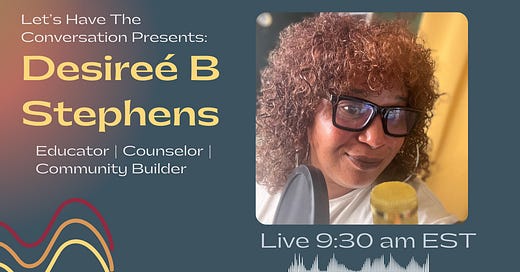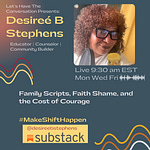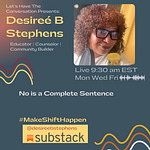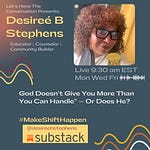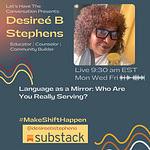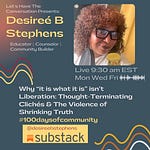Let’s be clear: change cannot happen without trust.
And not just the feel-good, “I believe in you” kind of trust. We’re talking about the grounded, accountable, I-show-up-even-when-it’s-hard kind of trust. The kind of trust that doesn't ask for perfection—but asks for presence. For (re)pair. For truth before it’s demanded. For honoring humanity without demanding martyrdom.
Today’s conversation is a reckoning—a mirror held up to how we show up in our relationships, our communities, and ourselves. Because in this season of shedding, of recalibrating, of choosing to build something different—we cannot skip the foundational work.
So I’m asking you:
Where does trust need to be rebuilt in your life?
And just as importantly: Where can it be born anew?
Let’s Talk About Trust and Transparency
In this clip, we talk about something that gets misunderstood all the time—the difference between honesty and transparency.
Here’s the thing:
Honesty is reactive. Transparency is relational.
One waits until you ask the question. The other offers the truth before you need to ask.
That’s the shift we’re exploring here.
Because how many of us grew up in households, churches, classrooms, or workplaces where we only heard the truth after a breakdown? After the trust was already cracked?
Transparency isn’t just about being real—it’s about building safety in advance.
It says: I respect you enough to tell you what’s going on before you have to guess.
It creates space for collaboration instead of control.
It replaces the pressure to “explain yourself” with the power of clarity and care.
“Transparency is the offering. Honesty is the response. Trust gets built when we stop making people dig for clarity.”
So here’s the question:
Where can you start offering clarity as care—not as damage control, but as daily practice?
Share this clip and ask your community:
What’s one place in your life where you could lead with transparency instead of defensiveness?
Because trust isn’t a feeling—it’s a choice we practice.
Three Key Takeaways
Trust is the Bedrock of Liberation Work.
Without trust, movements fracture. Communities falter. Real trust is built through consistency, transparency, and accountability—not charisma.Vulnerability + Boundaries = Relational Safety.
Trust isn't just about being open—it's about being held. Boundaries are love. They create space for truth, repair, and respect that goes both ways.Collective Trust Sustains Collective Change.
No one can hold the movement alone. When we share power, decisions, and care—we build something that lasts.
Behind the Paywall: Come Deeper
This work is too sacred to be surface-level. So let’s go there.
In the full version, we dive into:
How trauma and supremacy culture teach us to mistrust—even ourselves
The difference between discomfort and unsafety, and why it matters
Parenting without fear: raising children who trust themselves and speak truth to power
What collective trust looks like in real life—inside families, inside community, inside organizing spaces
Why “be the bigger person” is a trap, and how to reframe respect
Your paid subscription gives you access to these truths in full—and you have until April 14th (my birthday!) to redeem 46% off. Join before then to step inside this daily transformation journey with us.

